After almost 30 years in the waste management sector, Ian Wakelin chief executive of Biffa, steps down at the end of this week. Steve Eminton asked him about the challenges and highlights of his time in the industry as well as his plans for the future.
While Biffa may well be a household name in the UK, the company’s chief executive, Ian Wakelin, is also well-known in the waste sector and beyond. This is not just because he starred in the television programme, Undercover Boss, but also because he has held top positions in the industry for almost 30 years, most recently at Biffa where he led the business through change and a successful share listing.
Mr Wakelin says that being in the industry since 1989 has been “amazing” and that he’s enjoyed every minute of it despite the period being a time of change which was “clearly for the better” and is not over yet.
“I think we’re probably only two thirds of the way through that change. I think that change caused problems for our industry – what was up until then a relatively stable, relatively long-established, good economics, simple business model got turned on its head over a decade by landfill tax. This meant the whole business model, the service delivery, the supply chain had to change as it was no longer a truck and a man and a landfill – this just wasn’t enough anymore.”
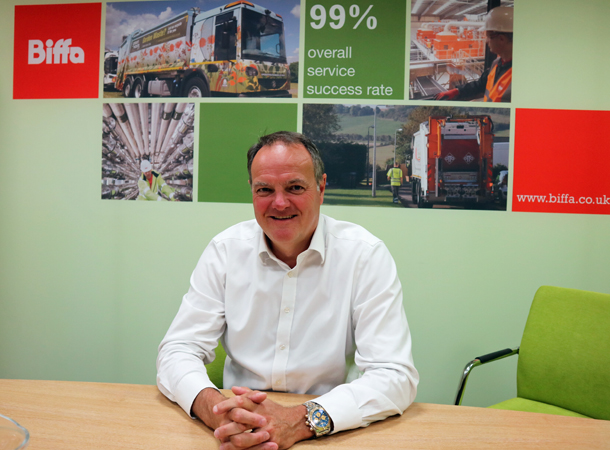
Ian Wakelin, who steps down at the end of this week from his chief executive post at Biffa
Landfill tax
For Mr Wakelin the tax was “the most transformative piece of legislation, certainly in our industry, that there has ever been.” And he is clear about its impacts: “It absolutely made customers and our industry change business approach, it makes the economics for recycling work and makes the economics of energy from waste work.”
Nevertheless, at a time when government is preparing a Waste and Resources Strategy and the Treasury is looking at potential fiscal measures around recycling, he urges caution on future levels of landfill tax and that big increases could cause problems because it is now at a stage where the tax is about right.
“I think there is a danger, that we’ve got to a position where the tax is at such a rate that landfill is now definitively more expensive. It means that for most materials that could be burned, or should be recycled, they are burned or recycled, and it’s at a level where we are seeing 70% of inputs into our sites are non-combustible or non-recyclable, inert in nature.”
He is clearly not in favour of landfill tax rising by too much, especially for inert material and is concerned about the potential for more flytipping if tax is raised significantly on this waste. “I just worry a little bit that if tax on landfill continues to go up and up and up, what you will see is more and more flytipping of material which cannot go anywhere else and that seems a little pointless… Imagine if inert tax was £50 a tonne, you would get more tipping of contaminated construction materials around the country.”
UK Waste
In his early days in the industry, Mr Wakelin was finance director at American-owned UK Waste. He almost joined Biffa at the turn of the century when UK Waste was acquired by Biffa for £380 million in June 2000.
That sale though saw him emerge on his own and go on to start his own business. He reflects: “I guess I was always a bit of a frustrated entrepreneur! In my early life I used to run a mobile disco and I ran a small jewellery business while at school – I always wanted to do something of my own.
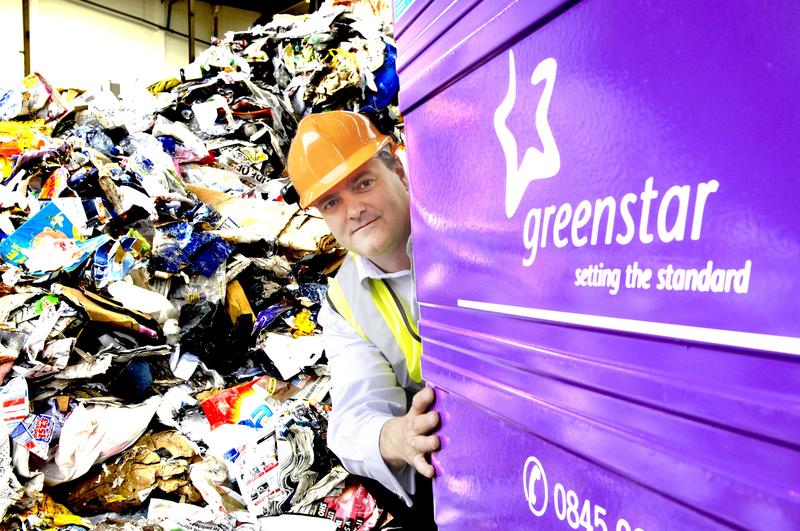
Inside the Aldridge MRF with Greenstar in 2008
“I was at that point in my career, in 2002, I was 37, if I didn’t do it then I was never going to do it. I called two colleagues and friends, Keith Brown and Matthew Hutton, and we raised some money from business angels and formed Materials Recycling which was to become Greenstar. I spent eight years there from 2002 to 2010 and our modus operandi was that we believed recycling was going to increase significantly.”
After a successful eight years, Greenstar was put up for sale with a turnover of around £150 million.
“Biffa was successful in acquiring it and I fully expected to be the person who was expected to leave,” he reveals (see letsrecycle.com story).
Combined group
Not only was the deal successful but Mr Wakelin was to then join Biffa. “I guess I had history in this industry – I knew the business pretty well from the outside, not the inside, so when the shareholders asked me if I would stay on and run the combined group, I was delighted and honoured to have that opportunity.”
As for the highlights of his time with Biffa, he says there are two, the share listing and putting the business back in good shape.

In 2012 celebrating Biffa’s 100th anniversary: (l-r) Ian Wakelin, Biffa chief executive; Barry Dennis, Environmental Services Association director general; Gill Biffa and husband Richard Biffa; and Robert Biffa
“Yes, the listing and putting Biffa back on the stock market two years ago was definitely one highlight. The objective of our shareholders was to crystallise and exit whether that was through a listing or a sale. We listed at 180 and we are up above 240 now.”
But the bigger highlight has been seeing all the operational and practical things across the company help return Biffa to what he describes as “its rightful place at the head of the industry… I don’t think it was there eight years ago, it had a very difficult period and had struggled through that transition I described earlier.”
Programme
Biffa’s media coverage has grown in recent years in a positive way. He says that he would not describe appearing in the Channel 4 Undercover Boss as a highlight – “the reality is that programme loves our industry! You can take someone with a suit and tie and you’re going to find something in a mess, ideal for the programme.” (see letsrecycle.com story)
Mr Wakelin had a more personal reason for taking part in the show. “They asked me for years and I declined, and the reason I did it in the end was that my father was very ill, he was diagnosed with cancer.
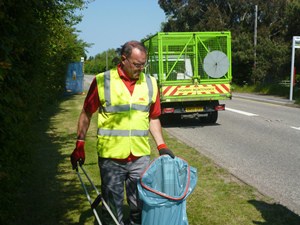
Ian Wakelin picks litter while posing as an out-of-work accountant on the Channel 4 programme, Undercover Boss, in 2013
“He was very proud of what I had achieved and he had every newspaper cutting and scrapbook. Channel 4 came and asked ‘would I do the programme?’ and I thought my dad would absolutely be delighted if his newspaper cuttings ended up with a TV programme.”
Biffa future
Looking ahead for the business, he says that acquisitions are likely to remain important. “They are a key part of our strategy, and it makes sense for us. I am convinced that the waste industry is continually becoming more and more complicated with our customers demanding more and more complex services and that lends itself to businesses of scale and size.
“That isn’t to say there isn’t a role for the smaller company, but it’s more and more challenging for smaller businesses to service customers’ needs. For example, if a customer needs a separate collection, an example would be a big pub, of food waste, glass, cans and plastics and residual waste. It probably needs four collections three times a week – for a small company trying to do four different collection services during the week is really difficult as well as having sustainable outlets. It makes sense that scale is more important now although I don’t think we’ll ever be utility like.”
Infrastructure
He confirms Biffa is looking at developing infrastructure in the form of the Protos energy from waste plant in Cheshire and Newhurst efw in Leicestershire. “There is absolutely a deficit of energy from waste infrastructure in this country, I know that because I collect more waste than anybody else. We have an obligation to dispose of it and every incinerator is completely full. And then the UK ships millions of tonnes to Europe. I believe in that but there is a deficit.”
And, Mr Wakelin explains that the company feels that instead of giving the waste to other businesses to make a return, it makes sense for Biffa to seek to do this itself in the UK.
“We have lots of waste and in Covanta we have a great partner. It’s a perfect partnership, we bring waste and knowledge of the waste market and they have the perfect experience in running those plants. If you think of PFI, the next best thing to having a 20 year local authority contract is a long term partnership with a business that controls lots of waste. We will always have a need for it.”
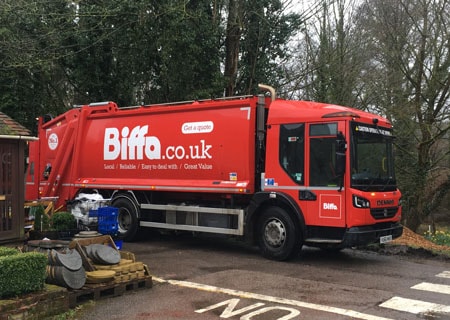
Biffa ‘has the waste for energy from waste plants’
Commodities
As for commodities, Biffa like other waste companies has seen losses on the waste paper front because of the restrictions on exports to China. Mr Wakelin is keen to see the risk on this reduced and shared.
“My view is that over the last 15 years, maybe longer than that, our industry has been way too accepting of transferring the risk on commodity price fluctuations by taking that risk, and that has meant for me that model has to change. If that model doesn’t change then recycling is an uninvestable business model in the UK, nobody would put any more money into that industry or should put any money into that industry.
“If you think of all the people involved in the recycling chain, you have the manufacturer, the domestic consumer, a local authority responsible for picking it up and getting rid of it, waste managers who are responsible for sorting it and the manufacturers at the end who will use it. Why would the waste management company be the one taking very substantially all the commodity price risk when it doesn’t own the problem?”
Risk
As to why waste companies got so involved in taking on the risk, he says that waste companies probably thought financial returns would have been stronger, whereas the reality “is commodity prices have been extremely volatile and the cost of recycling has been higher than anybody really expected it to be. Therefore you need relatively high commodity prices to make recycling work.”
There will be more separate collections of paper, because mixed papers are extremely difficult to find outlets for
Ian Wakelin
He describes as “nonsense” the notion that companies took the profits when times were good because the recycling industry has always been “very tough to make a reasonable return and that’s why it will change”.
Obligated authority
Councils, he says, need to realise the problem isn’t the waste management companies, and that ultimately it sits with the ‘obligated authority’. But, recycling will still happen because “ultimately, even with low commodity values, recycling is cheaper than the alternative. Local authorities have two choices, under almost any commodity price recycling will be cheaper than landfill or incineration.”
As for contamination, Mr Wakelin says that in “certain geographies” low levels are never going to be achieved and there has to be investment in taking the contamination out. He does however predict that there will be more separate collections of paper, because mixed papers are extremely difficult to find outlets for.
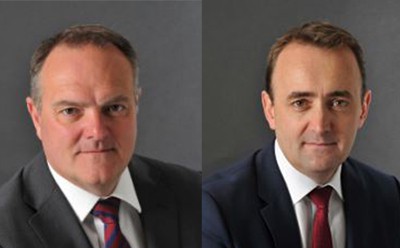
Company portraits: (l-r) Ian Wakelin with new Biffa chief executive Michael Topham
Successor
With regard to his successor as chief executive, Michael Topham, who moves up from his current post of chief financial officer on 1 October, Mr Wakelin says: “Michael and I have worked together for 13 years now. He has been an absolute great business partner and I have thoroughly enjoyed my time with him. My words of advice to him, ‘Enjoy it!’”
As for Mr Wakelin’s future, he pledges to always watch Biffa and the industry and looks set to return to business in some role, although not necessarily the waste sector.
“I’m only 56. I’ll do something and I have a whole load of things I’m going to do on my bucket list. This includes an 800 mile Harley Davidson trip around Italy with beards and leather jackets”. As for working life: “I will definitely end up doing something in business, but not full-time employment.”
The post Wakelin steps down from Biffa for a different future appeared first on letsrecycle.com.
Source: letsrecycle.com Waste Managment


